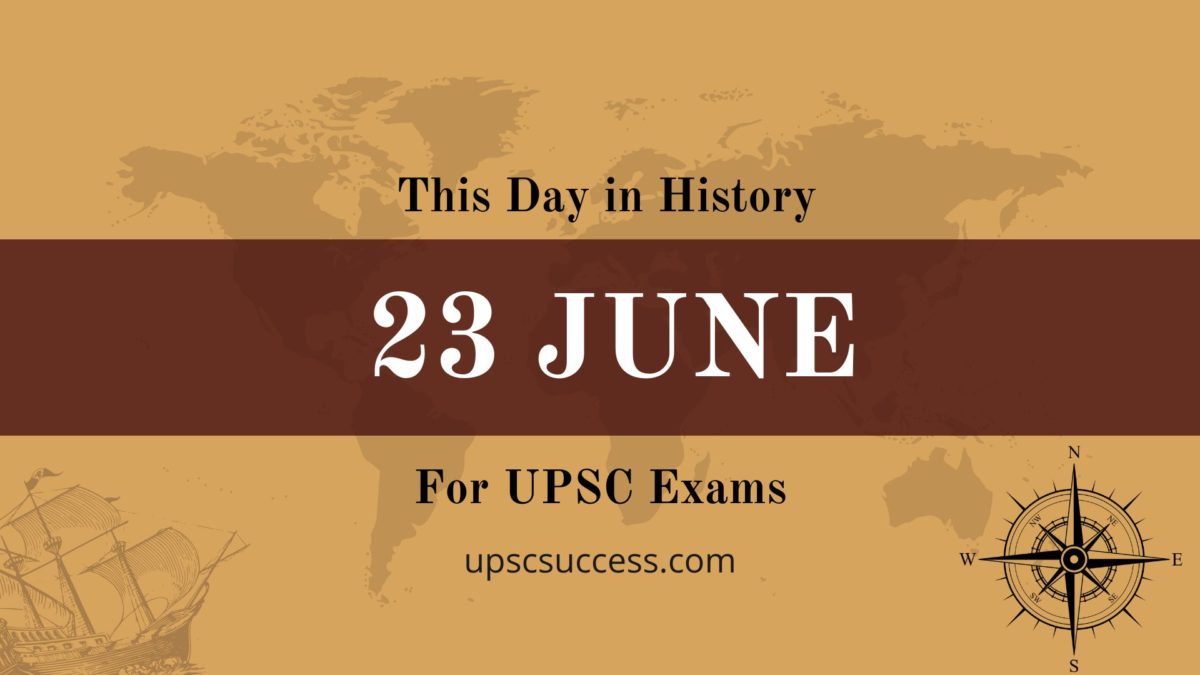Contents
This Day in History on 23 June
The historical events hold a lot of value for aspirants who are sitting for UPSC competitive exams including the IAS Exam.
On this page, we will list all historical events that occurred on 23 June. The students can refer to them while preparing for all competitive exams and banking exams.
Important Days
- United Nations Public Service Day (International)
Important Events
1661: Princess Catherine of Portugal wed King of England Charles II. Portugal gave island of Mumbai to England as present. The British got Bombay as dowry from Portugal.
1683: William Penn signs a friendship treaty with Lenni Lenape Indians in Pennsylvania.
1757: The Battle of Plassey started between Robert Clive, incharge of British army, and Nawab of Bengal, Siraj -Ud -Daula. In this battle Robert Clive won control of Bengal.
1810: Duncan Dock of Bombay was completed.
1868: Christopher Latham Scholes received a patent for a typewriter.
1894: The International Olympic Committee was established under the presidency of Demetrios Vikelas in Lausanne, Switzerland.
1911: King George V was today crowned “”King of the United Kingdom of Great Britain and Ireland and of the British Dominions beyond the seas, Defender of the Faith, Emperor of India,”” at Westminster Abbey in a ceremony evoking the continuity and tradition of the British monarchy magnificent spectacle. Thousands of spectators crowded the streets for hours, hoping to catch a glimpse of the royal procession. Partition of Bengal notified to create the Presidency of Bengal. The Imperial capital shifted from Calcutta to Delhi.
1927: All India Radio’s broadcasting service started in 1927 by privately owned transmitter at Bombay and Calcutta.
1930: The Simon Commission recommends a federal India and the separation of Burma at London.
1946: Gandhiji advises Congress not to enter Interim Government, but only Constituent Assembly.
1958: Tamil leaders in Madras call on Nehru to lobby for better treatment of Ceylon’s Tamil minority.
1979: West Indies won their second Cricket World Cup by defeating England by 92 runs.
1980: Sanjay Gandhi, the young politician, and son of the then Prime Minister Indira Gandhi, died in a plane crash.
1984: An Air-India jumbo jet plunged into the Atlantic Ocean near Ireland today, killing all 329 people on board. Indian officials said the crash apparently was caused by a bomb placed aboard the jetliner by a Sikh extremist group as retaliation for an army raid.
1985: Air India Jumbo Jet Boeing 747 ‘Kanishka’ which was travelling to Mumbai from Montreal crashed into the Atlantic Ocean after explosion near Ireland. 329 people on board died.
1987: D. Chakraborty was appointed as the Narcotics Commissioner of India. He headed this office till 02-07-1991.
1992: Tin Bigha Day protest in India of corridor opening to Bangladesh.
1993: Motilal Vohra made governor of UP.
1994: Two Britishers held hostage by terrorists in Kashmir for 17 days were set free.
1997: India and Pakistan reach accord on joint working groups to address outstanding issues including Kashmir and Siachen.
2000: Indian journalist Palagummi Sainath gets Amnesty International Global award for human rights journalism.
2016: The United Kingdom left the European Union with a 52% to 48% turnout.
Birthday / Anniversary
1877: Norman Pritchard, Indian-English hurdler and actor (d. 1929)
1894: Edward VIII, king of Great Brit/N-Ireland and emperor of India (1936), was born.
1895: Kali Charan Ghosh, great Hindi writer, was born at Calcutta.
1912: Alan Turing, an English mathematician, and computer scientist.
1920: Kesri Jagannathrao Joshi, senior leader of Janata Party in Karnataka, was born.
1934: Chandi Prasad Bhatt, an Indian Gandhian environmentalist, and social activist.
1935: Ram Kolarkar, famous marathi author and editor, was born.
1942: Jabbar Patel, an Indian theatre and film director.
1952: Raj Babbar, an Indian film actor and politician.
1956: Prashant Bhushan, an Indian lawyer.
Death / Death Anniversary
1761: Peshwa Balaji Bajirao Bhat, the 8th Peshwa of the Maratha Empire.
1836: James Mill, a Scottish historian, economist, political theorist, and philosopher.
1893: Wilhelm Eduard Weber, a German physicist.
1914: Bhaktivinoda Thakur, Indian guru and philosopher (b. 1838)
1939: Gijubhai Badheka, an educator who helped to introduce Montessori education methods to India.
1953: Syama Prasad Mukherjee, an Indian politician.
1971: Sriprakash, freedom fighter, prolific writer and member of the AICC, passed away.
1975: Prannath Thapar, former Chief of Army, died.
1980: Sanjay Gandhi, an Indian politician and the son of Indira Gandhi.
1980: V. V. Giri, Indian lawyer and politician, 4th President of India (b. 1894)
1990: Harindranath Chattopadhyay, an Indian English poet.
1997: Acharya Tulsi, the founder of Terapanthi sector in Jainism, died.
2015: Nirmala Joshi, Indian nun, lawyer, and social worker (b. 1934)

